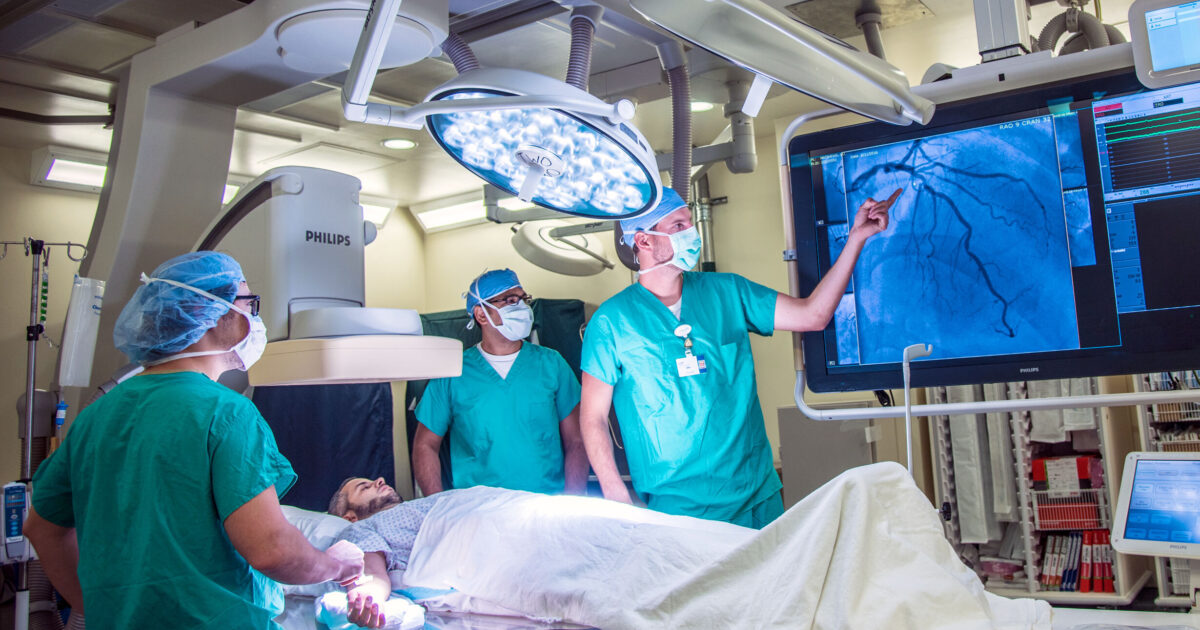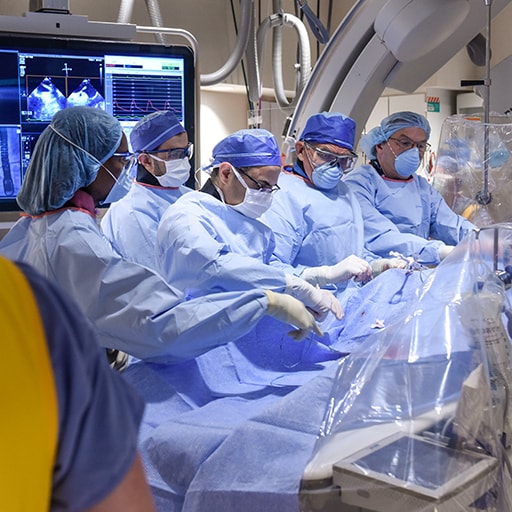Stay ahead of heart disease with Cardiology Jupiter’s approach
Stay ahead of heart disease with Cardiology Jupiter’s approach
Blog Article
Comprehending the Value of Cardiology in Modern Medical Care Providers
Cardiology plays a critical role in modern healthcare, particularly as cardiovascular disease remains to be the leading reason for mortality worldwide. Advancements in diagnostics and treatment have transformed patient care, enabling earlier interventions and boosted end results. Furthermore, the change in the direction of preventative cardiology encourages people to manage their health proactively. As technology proceeds to evolve, the combination of innovative solutions may additionally redefine cardiology's influence on public health and wellness, motivating a closer exam of arising patterns and their implications.
The Prevalence of Heart Condition and Its Influence on Public Health And Wellness
Heart disease stays the leading cause of fatality internationally, its impact expands much beyond private patients to influence public health and wellness systems and economies. The high occurrence of cardiovascular disease positions a considerable pressure on health care sources, requiring increased financing for therapy, avoidance, and rehab programs. Public health efforts must attend to threat elements such as excessive weight, smoking, and inactive way of livings, which contribute considerably to the climbing incidence of heart conditions.Moreover, the economic worry connected with heart illness is tremendous, encompassing not only straight clinical costs however additionally indirect expenditures connected to lost efficiency and early death. Communities deal with difficulties in taking care of these prices, frequently causing differences in healthcare access and results. As the population ages and lifestyle-related dangers remain to rise, the seriousness for reliable cardiology interventions ends up being extremely important. Consequently, attending to heart problem is not only a matter of private wellness but likewise a critical public health concern.
Developments in Heart Diagnostics and Imaging Techniques
Current advancements in heart diagnostics and imaging techniques have actually changed the area of cardiology, enhancing the ability to keep an eye on and identify heart illness. Strategies such as cardiac MRI, CT angiography, and echocardiography have become increasingly sophisticated, offering comprehensive photos of heart frameworks and features. These techniques permit the very early identification of conditions like coronary artery illness, heart failure, and valvular disorders.Moreover, improvements in non-invasive diagnostics, such as wearable innovation and remote surveillance gadgets, have actually equipped individuals and doctor. These devices assist in real-time monitoring of heart rhythms and various other necessary signs, resulting in prompt interventions. Additionally, expert system is being incorporated into imaging analysis, enhancing precision and performance in medical diagnosis.
Innovations in Therapy Choices for Heart Conditions
Current improvements in cardiology have led to considerable innovations in therapy options for heart conditions. These include advanced surgical methods that boost procedural end results and arising drugs that supply new opportunities for treatment. As the area advances, these innovations play an essential function in enhancing person treatment and results.
Advanced Surgical Techniques
Technologies in surgical techniques have changed the landscape of cardiology, offering brand-new hope for people with heart problems. Minimally invasive treatments, such as catheter-based treatments, have actually significantly minimized healing times and hospital keeps. Methods like robotic-assisted surgical treatment improve precision, allowing specialists to browse complicated physiological structures with greater accuracy. Advancements in imaging modern technology help with real-time visualization during procedures, enhancing outcomes. Transcatheter aortic shutoff replacement (TAVR) exemplifies an advancement in treating aortic stenosis, allowing valve replacement without open-heart surgical treatment. In addition, hybrid methods that integrate surgical and catheter-based methods supply customized solutions for different cardiac concerns. These sophisticated medical methods not only improve client security yet likewise broaden therapy alternatives, emphasizing the crucial function of technology in modern cardiology methods.
Arising Drugs and Treatments
As the landscape of cardiology proceeds to progress, arising drugs and treatments play a critical duty in boosting therapy choices for heart problems. Advancements such as novel anticoagulants and progressed lipid-lowering agents have actually changed the administration of cardio illness, considerably lowering individual morbidity and death. In addition, the growth of genetics therapies and regenerative medicine uses promising methods for treating problems previously deemed incurable. Medical trials are continually revealing the efficiency of these treatments, pressing the borders of typical treatments. Moreover, the integration of electronic health and wellness technologies helps with personalized medication, enabling customized therapy plans based upon hereditary and lifestyle aspects. Jointly, these advancements underscore the dynamic nature of cardiology, enhancing person results and redefining requirements of care in contemporary medical care.
The Role of Preventive Cardiology in Client Treatment
Preventative cardiology plays an important function in individual treatment by concentrating on the identification of danger variables that add to heart disease. Through lifestyle modification techniques and very early discovery strategies, doctor can effectively reduce the incidence of cardiovascular occasions - Cardiology care. This aggressive technique not just enhances individual results but also promotes long-term health
Threat Variable Recognition
While heart diseases remain a leading root cause of morbidity and death worldwide, reliable danger aspect identification functions as a keystone of precautionary cardiology. Determining risk variables such as hypertension, diabetic issues, family members, and hyperlipidemia history is essential for very early treatment. Medical care experts make use of different screening approaches to assess these factors, permitting tailored safety nets. Additionally, recognizing a client's way of living options, such as smoking and physical inactivity, further notifies risk evaluations. This comprehensive analysis allows medical professionals to develop why not find out more tailored care strategies focused on mitigating risks. By focusing on danger variable identification, health care systems can enhance individual outcomes and minimize the total burden of cardio conditions, ultimately adding to improved public health and wellness approaches and resource allowance.
Way Of Living Modification Techniques
A wide variety of researches highlights the important role of way of life adjustment approaches in reducing cardiovascular illness danger. These approaches encompass nutritional changes, enhanced exercise, smoking cigarettes cessation, and weight management. By taking on a heart-healthy diet regimen abundant in fruits, veggies, whole grains, and lean proteins, individuals can lower cholesterol levels and blood pressure. Routine physical task reinforces the heart and boosts total cardio wellness. In addition, giving up smoking cigarettes substantially decreases the danger of cardiovascular disease and improves recovery rates for those with existing problems. Weight monitoring further adds to cardiovascular wellness by mitigating various other threat variables such as diabetes mellitus and high blood pressure. Carrying out these way of life transforms not just advertises private well-being but additionally functions as a foundation of precautionary cardiology in client care.
Early Discovery Methods
Way of life modifications greatly add to minimizing cardio illness dangers, however they are most efficient when coupled with early detection techniques. Preventative cardiology highlights the importance of recognizing prospective heart issues prior to they escalate right into severe conditions. Strategies such as high blood pressure surveillance, cholesterol testing, and advanced imaging modern technologies like echocardiograms play important duties in examining cardiovascular wellness. Biomarkers and genetic screening also improve the precision of early discovery, enabling tailored preventative strategies. Normal cardiac danger evaluations equip doctor to interfere proactively, potentially protecting against cardiovascular disease and strokes (Dr Garcia). By integrating these very early detection techniques right into routine treatment, people can benefit from prompt way of living interventions and targeted treatments, inevitably improving results and boosting lifestyle
Integrating Technology Into Cardiology Practices
As developments in innovation remain to improve numerous fields, the integration of ingenious devices and systems right into cardiology techniques has actually become vital for boosting person care and outcomes. Telemedicine platforms permit cardiologists to keep an eye on individuals from another location, boosting accessibility to care while reducing the burden on healthcare facilities. Wearable gadgets, such as smartwatches, allow constant heart price tracking, informing both medical professionals and people to possible concerns in real-time. In addition, expert system (AI) is being made use of to assess substantial quantities of cardiac data, assisting in early medical diagnosis and personalized therapy strategies. Advanced imaging methods, including 3D echocardiography, enhance visualization of heart structures, leading to extra specific treatments. Electronic health records (EHRs) simplify person info administration, guaranteeing that cardiologists have immediate accessibility to vital data. Together, these technical improvements are transforming cardiology, advertising aggressive administration and improved wellness results for patients with cardio conditions.
The Significance of Patient Education And Learning and Engagement
Individual education and interaction play a pivotal function in the management of cardiovascular wellness. By gearing up people with understanding concerning their conditions, treatment alternatives, and lifestyle modifications, healthcare suppliers empower individuals to take an energetic duty in their care. This positive strategy can lead to enhanced adherence to suggested drugs, dietary modifications, and workout routines, ultimately decreasing the threat of complications.Engagement additionally fosters a strong patient-provider connection, urging open interaction and trust. When clients really feel educated and entailed, they are more likely to voice issues and ask concerns, which can bring about far better clinical outcomes. Additionally, academic resources, such as workshops or digital platforms, can improve news understanding and advertise self-management methods. On the whole, focusing on person education and learning and involvement is essential for enhancing cardiovascular health, enhancing top quality of life, and lowering health care prices connected with cardio illness.
Future Trends in Cardiology and Their Prospective Influence

Often Asked Questions
What Lifestyle Changes Can Lower Heart Problem Danger?
The present question addresses lifestyle adjustments that can considerably minimize heart disease risk. Dr Garcia. Embracing a balanced diet regimen, involving in routine exercise, keeping a healthy weight, managing stress and anxiety, and preventing tobacco can especially enhance cardiovascular health
Just How Can I Acknowledge Early Indicators of Heart Issues?
Identifying early signs of heart issues entails tracking symptoms such as upper body pain, lack of breath, fatigue, and uneven heartbeat. Prompt awareness of these signs can prompt needed medical examination and intervention for much better outcomes.
What Are the Differences In Between Cardiologists and Cardiac Surgeons?
The distinctions in between cardiologists and cardiac doctors hinge on their duties; cardiologists mostly detect and take care of heart disease with non-invasive methods, while cardiac surgeons perform surgeries to remedy structural heart issues. Each plays an essential, unique function.

Just how Frequently Should I Obtain My Heart Wellness Checked?
The frequency of heart checkup differs based on specific danger variables. Normally, grownups must go through analyses every one to 2 years, while those with present conditions may call for more constant assessments as suggested by healthcare specialists.
What Role Does Genes Play in Cardiovascular Disease Risk?
Genetics significantly affects cardiovascular disease threat, with familial patterns showing inherited conditions. Particular genes can incline individuals to hypertension, cholesterol problems, and other cardio issues, highlighting the significance of genetic testing in evaluating heart health. Heart disease stays the leading cause of death globally, its impact expands much past private patients to influence public health systems and economic situations. Public health efforts should resolve danger variables such as obesity, cigarette smoking, and sedentary lifestyles, which contribute significantly to the climbing occurrence of heart conditions.Moreover, the economic worry linked with heart illness is immense, incorporating not just straight medical costs however additionally indirect costs connected to shed performance and early mortality. Preventative cardiology plays a necessary function in client treatment by focusing on the recognition of risk factors that add to heart illness. Man-made intelligence (AI) and maker understanding are improving diagnostics and client monitoring, enabling very early discovery of heart diseases. The distinctions in between cardiologists and heart cosmetic surgeons exist in their roles; cardiologists mostly detect and manage heart conditions via non-invasive methods, while cardiac doctors perform medical procedures to deal with structural heart issues.
Report this page